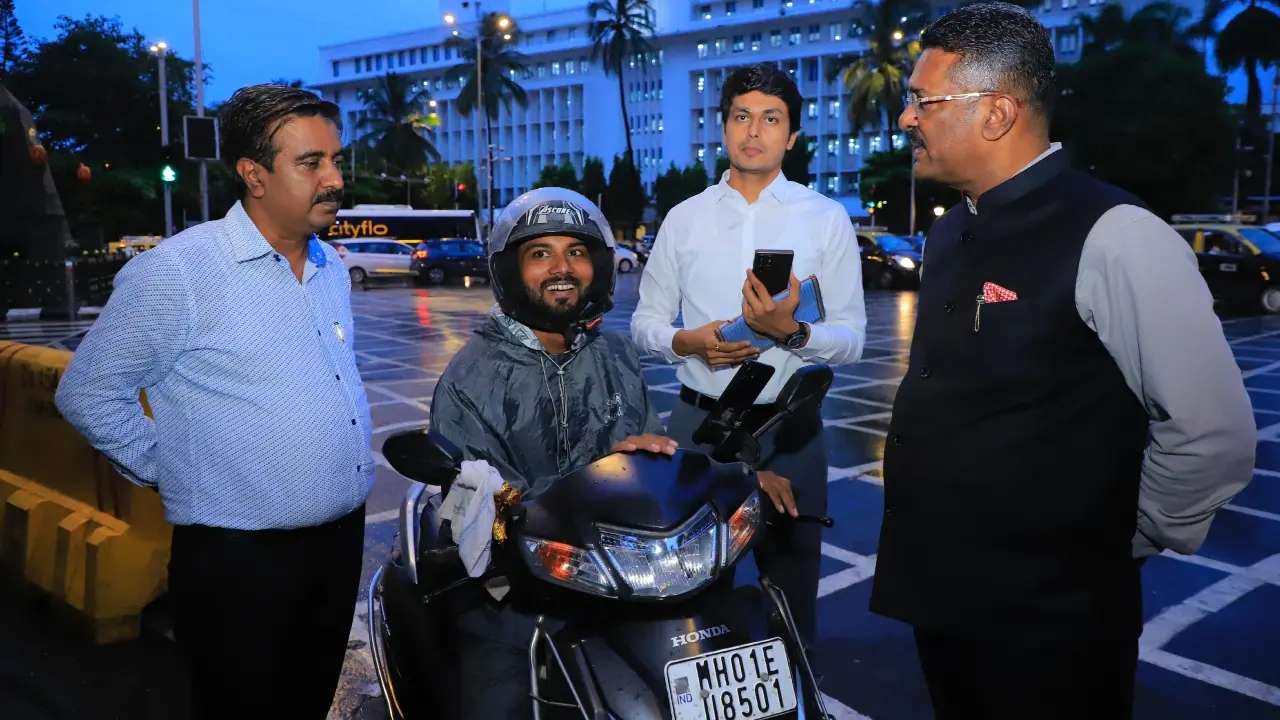Transport Minister of Maharashtra conducted an unannounced sting operation in Mumbai, posing as an anonymous rider to successfully book a Rapido bike taxi at Shaheed Babu Genu Chowk, Mantralaya—revealing that unauthorised bike-taxis are still operating despite regulatory restrictions.
Mumbai’s transport authorities recently implemented a strict e-bike policy permitting only electric two-wheelers that meet regulatory standards to operate as bike taxis. Official statements from the Transport Department had previously denied any presence of illegal bike-taxi services in the city. To verify those assurances, the minister personally booked a Rapido ride under an assumed identity. Within ten minutes, a bike taxi arrived at his chosen location—demonstrating that illegal services continue to function unabated. Upon confronting the driver, the minister offered ₹500 and clarified his intention: to penalise orchestrators, not impoverished drivers. Legal experts view this as a significant escalation in political oversight—though it raises questions about enforcement of rider safety standards and licences. Authorities contend their stance remains that bike taxis must observe e-bike regulations and secure proper permits before operating.
This incident reinforces transportation sector concerns that gig-economy services like Rapido expand faster than regulators can adapt. While electric bike taxis are intended to reduce urban emissions, their unregulated rampancy undermines both environmental aims and fair-market competition. Private transport operators have long maintained that such services—without permits, safety checks, or fare monitoring—distort market balance and pose risks to commuters. Transport analysts suggest the minister’s move symbolises a shift from rhetoric to action. The sting has the potential to galvanise stricter enforcement of the new policy: mandating e-bike usage, vehicle certification, driver licensing, and app oversight. They emphasise the need to hold platform companies accountable and apply pressure on policy implementers.
Yet, the minister’s public chiding of the driver—classified as a “poor person”—reflects an ongoing debate about justice. Authorities have a dual obligation: to hold platforms accountable and protect livelihoods in fragile gig economies. While the policy frameworks are in place, enforcement remains a challenge, especially in dense urban areas like Mumbai. In response to the sting, the Transport Department confirmed a full review and pledged immediate action. Officials stated that any detected unauthorised operators would face suspension of service, vehicle impoundment, and app blacklisting. Simultaneously, the department will expedite e-bike compliance verification, adding more on-ground enforcement units to busy zones.
From an urban sustainability perspective, electric bike taxis can reduce carbon emissions and traffic congestion—a core municipal objective. However, these benefits depend on regulated deployment, including speed governors, fare caps, insurance, and digital tracking. Analysts warn that illegal operators avoid these safeguards, risking safety and equity. Commuters have mixed reactions. Some praise the minister’s direct action as a long-overdue crackdown; others question the symbolic gesture as policy theatre. For riders depending on affordable mobility, availability matters—even if today’s availability is unauthorised. Civic activists echo the minister’s stance but call for comprehensive verification: requiring verification badges displayed in apps, background checks, and transparent data sharing from platform providers.
Policy experts have noted that electric shared mobility must be supported by robust regulation. London, Paris, and New York have succeeded by implementing licensing systems integrated with ride-hailing apps, driver training, and emissions standards. Adopting best practices in India could ensure sustainable growth while protecting vulnerable gig workers. As enforcement ramps up, Uber, Rapido and Ola have all signalled cooperation. Platform officials confirmed they will temporarily deactivate non-compliant partner accounts involved in illegal bike taxis. They are also working with the Transport Department to verify e-bike compliance and introduce digital ride passes for informed commuters.
Still, there is more to do. Civil society organisations insist that bringing illegal actors into compliance is not enough—structural reform is essential. They recommend mandatory safety audits, real-time monitoring via GPS, and embedded grievance redress systems for riders. Without pilot projects and metrics, regulation risks being reactive rather than proactive. For now, the minister’s field test has punctured complacency and reignited debate on shared mobility governance. It underscores the complexity of balancing innovation, safety, equity and sustainability. As Mumbai presses forward, the next steps will determine whether electric bike taxis can serve city goals or spiral unregulated.
Also Read : Mumbai BMC Launches Pothole App Amid Surge In Monsoon Damage Complaints


